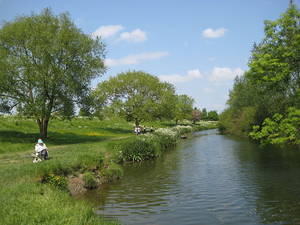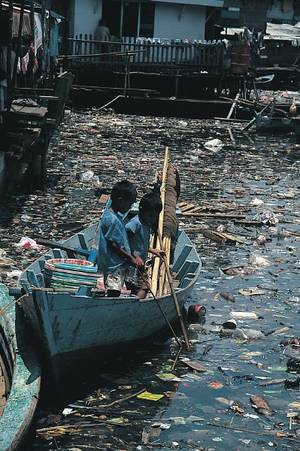The Great Cam Cleanup
Interview with
Kat - One factor that has a significant impact on the quality of rivers is human activity. Tonnes of rubbish is just chucked into rivers and canals every year and this not only makes the rivers look pretty dirty, it also does threaten wildlife.
Now here in Cambridge the Great Cam Cleanup is a volunteer project to help keep the river clean and Ben Valsler went along to help out.
Ben - I have spent this morning alongside many other volunteers pulling rubbish out of the River Cam and out of the banks of the River Cam. This had been part of the Great Cam Cleanup, now in its fifth year: an opportunity for volunteers from the community to get together and try and clean up their waterways and their green spaces.
 I am here with Luther Phillips who organised this year's Great Cam Cleanup and also with Andrew Walters from Anglian Water's RiverCare project. So Luther, why have you organised the Great Cam Cleanup?
I am here with Luther Phillips who organised this year's Great Cam Cleanup and also with Andrew Walters from Anglian Water's RiverCare project. So Luther, why have you organised the Great Cam Cleanup?
Luther - Because I care about the river Cam. I live on the river Cam and I really do have a passion for the wildlife in Cambridge. I live on Stourbridge Common and it is not far from the centre of Cambridge, but on a daily basis I see herons, I see grebes; I see kingfishers, the cows grazing on the Common.
The rubbish that we generate, if we can just be conscious of the fact that we generate rubbish and if we are in a position that we can actually recycle that rubbish, it will create an environment where we enjoy our green spaces and our river more and more.
Ben - And it's not just the wildlife, is it? I know a great deal of people walk their dogs, people cycle along that route and the fact that it is cleaner in itself makes it more enjoyable for people.
Luther - There are many different river users that obviously use the river: they're rowers, they're dog walkers, there is a residential boating community, anglers and obviously everyone has a vested interest in keeping the river clean but the fact that there are so many different walks of life that use the river. It is important that we can bring these people together in an event like this to help them to be able to take care of it, to maintain and to sustain what we created today and in particular, we want to create a legacy that once people see that, you know the next few days of, the open spaces will be clean; the river will be clean in their consciousness and they'll think well actually we can sustain this.
So it is a very important event that will create a legacy in people's minds as something that they can sustain.
Ben - Alongside us today I think I have seen at least three generations of people helping to pick up rubbish and to keep the river clean. How many people do actually get involved in this?
Luther - We have had over 225 people who registered in advance for the event. Today we have over 185 signatures and there were people who just came along, took part and disappeared without even just making their presence known. So I would estimate there's over 200 people that physically took part today.
 Ben - And between 200 people it actually makes cleaning this stretch of the river, seem relatively light work but how much rubbish did you pull out?
Ben - And between 200 people it actually makes cleaning this stretch of the river, seem relatively light work but how much rubbish did you pull out?
Luther - Well that's difficult to estimate because at this stage we have just concluded the event. However, I must say that it is increased on the number of bags that we collected last year. There were over 660 bags of recyclable rubbish last year, 100 and something bikes which were pulled out of the river. There were a vast number of trolleys.
So it's a fantastic effort by the people of Cambridge who have just spent their time, they sacrificed six-seven hours of the day and they have given something back to Cambridge which is very important. It has created a more cohesive community and it's empowered people because they are more passionate and they will go away from today and they will talk to their friends, they will talk to their colleagues at work on Monday and I am sure, next year this event which will be on 27th of March, 2010 will be even bigger than it was today.
Ben - I am also joined by Andrew Walters from the Anglian Water RiverCare project. Andrew, you must be extremely pleased to see volunteers coming out in such huge numbers to try and keep the rivers clean.
Andrew - It is great. It has been a really great day to have such local people concerned about their local environment. I mean the river here, the Cam, it is a green wildlife corridor really running through the city and so to have this many people out there, just taking real hands-on practical action to clean it up is really encouraging.
Ben - So do we know for a fact that removing rubbish from inside and around a river is actually good to keep it greener, to keep it cleaner, to encourage the wildlife here?
Andrew - Yeah we do, I mean directly, without being too gruesome, we know that when unfortunately otters are killed on roads and autopsies are performed, a lot of rubbish is found within their guts so it is genuinely polluting the environment and it is a danger to wildlife as well.
More indirectly, I think when people see a river and the riverbanks that are clean and free of litter they are more inspired by them and more encouraged to respect them and they have a sense of ownership of them and really appreciate them as the kind of the urban habitats that they are.
Ben - So what is it that you at RiverCare actually do?
 Andrew - RiverCare, our role really is to support communities around the Eastern region to set up local groups which do just this, they are practically working on the local rivers, removing rubbish, removing litter and also doing surveys of the wildlife that is there.
Andrew - RiverCare, our role really is to support communities around the Eastern region to set up local groups which do just this, they are practically working on the local rivers, removing rubbish, removing litter and also doing surveys of the wildlife that is there.
Ben - So it is not just clearing up rubbish then, it's not literally a rubbish removal project. You also have wildlife surveys and I assume you deal with the invasive species that we have.
Andrew - That's right. I mean it's a two-fold thing really. Firstly, the groups do great work in logging where certain invasive species are occurring but also in the instance of Himalayan Balsam which is an invasive weed that's becoming more prevalent on our riverbanks, in midsummer when it is just coming up the groups do lot of work in removing it from the riverbanks which enables the native wild flowers to grow and prevent some bank erosion during the winter.
Ben - And the wildlife surveys, the bio-diversity surveys that you run, is there anything particularly exciting we could see around here?
Andrew - I think there is, I mean I think an issue is that often when we see a bike or shopping trolley, or some litter in our local river, we think that it's probably in a poor state but the reality is actually that the biodiversity within the rivers and on the banks is very rich and the rivers are generally in good quality around Cambridge and so don't be put-off when you see an odd bit of litter around.
Ben - What should people do if they live near a river and want to get involved with making it a happier, healthier place to be?
Andrew - If you are interested in getting involved then please do take a look at our website which is www.rivercare.org.uk, have a look on there and see if there is a local group in your area and join them in doing this kind of thing.
Ben - And of course one essential thing is just not to drop litter in the first place.
Andrew - Absolutely, it's great to have days like these today with people picking up all this huge amounts of litter but then of course the great way to start is just by not dropping it in the first place.
Kat - And that was Andrew Walters from RiverCare and before him Luther Phillips who organises the Great Cam Cleanup. They were both talking to our producer Ben Valsler about the importance of cleaning up the river for both the wildlife and the local community.









Comments
Add a comment